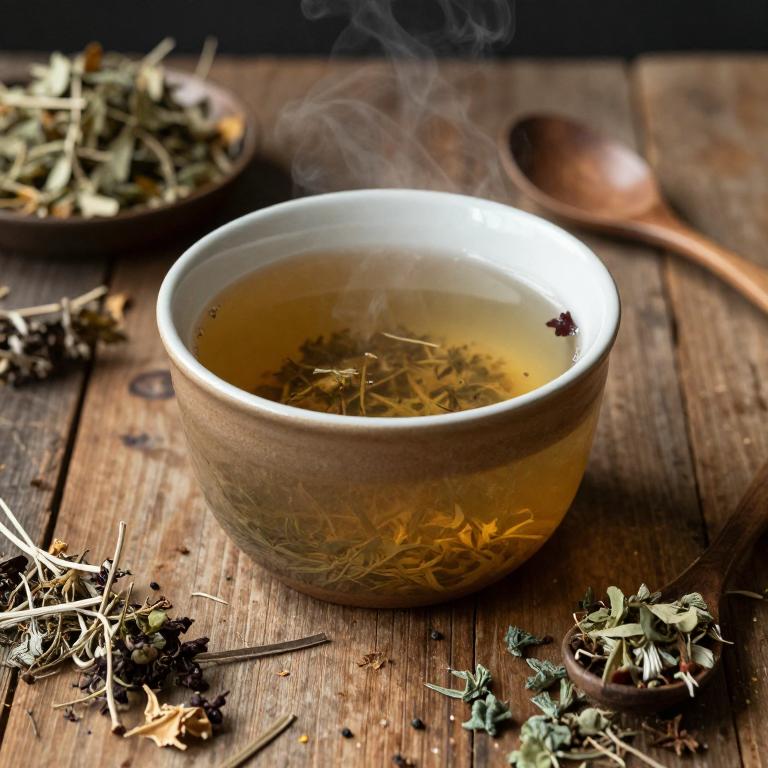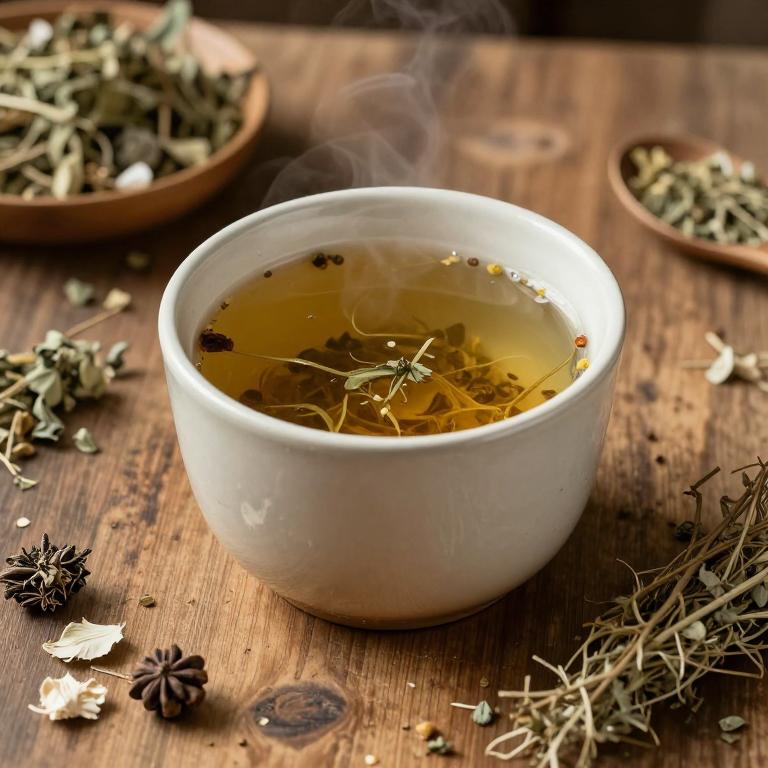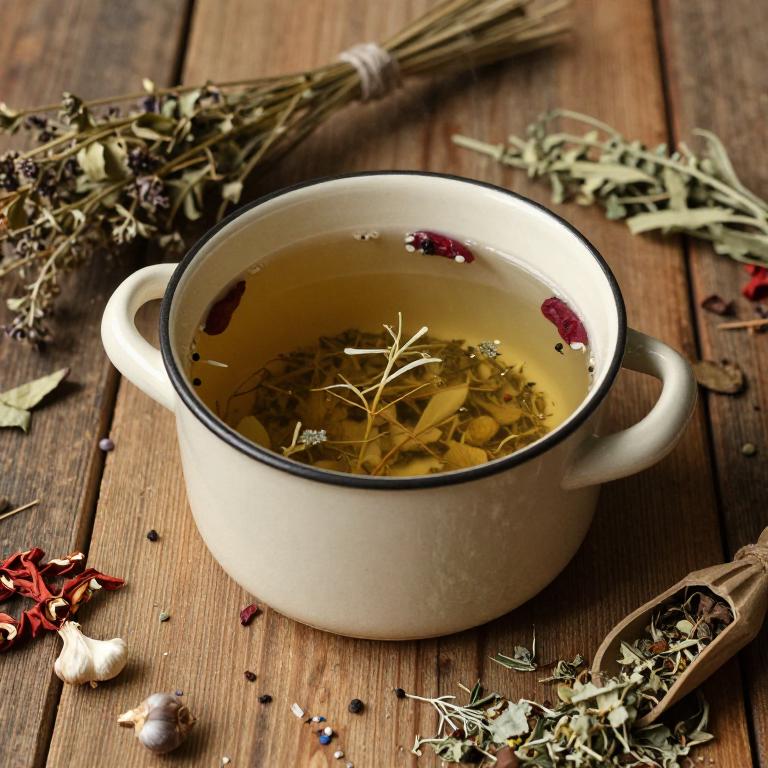10 Best Herbal Decoctions For Dry Cough

Herbal decoctions have been traditionally used to alleviate dry cough by soothing the respiratory system and reducing irritation.
Common herbs such as licorice root, thyme, and eucalyptus are often included in these preparations due to their anti-inflammatory and expectorant properties. To prepare a decoction, the herbs are simmered in water for an extended period to extract their active compounds, creating a potent herbal tea. This method is favored for its natural approach and minimal side effects compared to pharmaceutical treatments.
Herbal decoctions can be a gentle and effective option for managing chronic or persistent dry cough when used consistently and under proper guidance.
Table of Contents
- 1. Thyme (Thymus vulgaris)
- 2. Eucalyptus (Eucalyptus globulus)
- 3. Peppermint (Mentha piperita)
- 4. Fennel (Foeniculum vulgare)
- 5. Salvia (Salvia officinalis)
- 6. Scots pine (Pinus sylvestris)
- 7. Rosemary (Rosmarinus officinalis)
- 8. Ginger (Zingiber officinale)
- 9. Chamomile (Matricaria chamomilla)
- 10. Hyssop (Hyssopus officinalis)
1. Thyme (Thymus vulgaris)

Thymus vulgaris, commonly known as thyme, has been traditionally used in herbal medicine for its expectorant and antimicrobial properties, making it a popular choice for treating dry cough.
The essential oils found in thyme, particularly thymol and carvacrol, help to loosen mucus and reduce inflammation in the respiratory tract, providing relief from persistent dry cough. To prepare a thyme herbal decoction, fresh or dried thyme leaves are typically steeped in hot water for several minutes, allowing the active compounds to infuse into the liquid. This natural remedy is often recommended as a soothing alternative to over-the-counter cough suppressants, especially for mild to moderate cases of dry cough.
However, it is important to consult with a healthcare provider before using thyme decoctions, especially for individuals with allergies or those taking other medications.
2. Eucalyptus (Eucalyptus globulus)

Eucalyptus globulus, commonly known as Australian tea tree or blue gum, is often used in herbal decoctions to alleviate symptoms of dry cough due to its expectorant and anti-inflammatory properties.
The leaves of this plant contain compounds such as eucalyptol, which can help loosen mucus and reduce irritation in the respiratory tract. To prepare a decoction, dried eucalyptus leaves are typically boiled in water for several minutes, then strained and consumed as a warm tea. This herbal remedy is often recommended for its soothing effect on the throat and its ability to ease breathing in cases of persistent dry cough.
However, it is important to consult with a healthcare professional before use, especially for individuals with allergies or underlying health conditions.
3. Peppermint (Mentha piperita)

Mentha piperita, commonly known as peppermint, is often used in herbal decoctions to alleviate symptoms of dry cough due to its soothing and expectorant properties.
The preparation involves steeping fresh or dried peppermint leaves in hot water to create a calming herbal tea. This decoction helps to relax the bronchial muscles, reduce irritation, and ease the persistent, non-productive cough associated with respiratory conditions. Its menthol content also provides a cooling effect that can soothe the throat and reduce coughing fits.
While generally safe, it is advisable to consult a healthcare professional before using peppermint decoctions, especially for prolonged use or in individuals with certain medical conditions.
4. Fennel (Foeniculum vulgare)

Foeniculum vulgare, commonly known as fennel, has been traditionally used in herbal medicine to alleviate symptoms of dry cough due to its expectorant and anti-inflammatory properties.
A decoction made from the seeds of fennel is often prepared by simmering them in water for several minutes to extract their active compounds. This herbal remedy is believed to help soothe irritated airways and reduce the frequency of coughing by promoting mucus clearance. It is typically consumed as a warm tea, often combined with honey or lemon to enhance its soothing effects.
While generally considered safe, it is advisable to consult a healthcare professional before using fennel decoctions, especially for prolonged periods or in individuals with known allergies or medical conditions.
5. Salvia (Salvia officinalis)

Salvia officinalis, commonly known as sage, has been traditionally used in herbal medicine for its soothing properties, particularly in the treatment of dry cough.
Herbal decoctions made from dried sage leaves are prepared by simmering the plant material in water, allowing the active compounds such as rosmarinic acid and flavonoids to infuse into the liquid. These compounds are believed to have anti-inflammatory and antimicrobial effects, which can help reduce irritation in the throat and suppress coughing. Sage decoctions are often recommended for their ability to soothe the respiratory tract and provide relief from persistent dry cough symptoms.
However, it is important to consult with a healthcare professional before using sage, especially for prolonged periods or in conjunction with other medications.
6. Scots pine (Pinus sylvestris)

Pinus sylvestris, commonly known as Scots pine, has been traditionally used in herbal medicine for its respiratory benefits, particularly in the treatment of dry cough.
The bark and needles of the pine tree contain various bioactive compounds, including flavonoids and terpenes, which possess anti-inflammatory and expectorant properties. Herbal decoctions made from Scots pine are prepared by simmering the dried bark or needles in water for an extended period, allowing the active ingredients to be extracted. These decoctions are believed to soothe irritated airways and reduce coughing by promoting mucus clearance and easing bronchial spasms.
While generally considered safe, it is advisable to consult a healthcare professional before using Scots pine decoctions, especially for prolonged periods or in combination with other medications.
7. Rosemary (Rosmarinus officinalis)

Rosmarinus officinalis, commonly known as rosemary, has been traditionally used in herbal medicine for its potential respiratory benefits.
Rosemary herbal decoctions are often prepared by simmering the dried leaves in water to extract their essential oils and active compounds. These decoctions may help alleviate symptoms of dry cough by acting as a mild expectorant and anti-inflammatory agent. The aromatic compounds in rosemary, such as camphor and pinene, are believed to soothe the throat and reduce irritation.
While rosemary decoctions can be a natural remedy for dry cough, it is advisable to consult a healthcare professional before use, especially for prolonged or severe symptoms.
8. Ginger (Zingiber officinale)

Zingiber officinale, commonly known as ginger, has been traditionally used in herbal medicine for its expectorant and anti-inflammatory properties, making it a popular remedy for dry cough.
When prepared as a herbal decoction, ginger is typically sliced and simmered in water to extract its active compounds, such as gingerol and shogaol, which help soothe the throat and reduce irritation. This decoction can be consumed warm, providing a comforting effect that may help alleviate the persistent, non-productive nature of a dry cough. Its warming properties are believed to help loosen mucus and ease respiratory discomfort, though it is often recommended to consult a healthcare provider for persistent or severe symptoms.
Overall, ginger decoctions offer a natural, aromatic alternative for managing dry cough, though their efficacy may vary depending on individual health conditions and the underlying cause of the cough.
9. Chamomile (Matricaria chamomilla)

Matricaria chamomilla, commonly known as chamomile, has been traditionally used for its calming and anti-inflammatory properties, making it a popular choice for herbal decoctions aimed at alleviating dry cough.
The preparation involves steeping dried chamomile flowers in hot water to create a soothing tea, which can be consumed several times a day. This herb is believed to help reduce irritation in the throat and ease respiratory discomfort associated with dry, persistent coughs. Its mild sedative effect may also contribute to improved sleep, which is beneficial for individuals suffering from nighttime coughing.
While generally considered safe, it is advisable to consult a healthcare professional before using chamomile decoctions, especially for prolonged periods or in combination with other medications.
10. Hyssop (Hyssopus officinalis)

Hyssopus officinalis, commonly known as hyssop, has been traditionally used in herbal medicine for its expectorant and antispasmodic properties.
Its decoctions, made by simmering the dried leaves and flowers in water, are often recommended for alleviating symptoms of dry cough due to their ability to soothe irritated respiratory passages. The plant contains essential oils, flavonoids, and mucilage, which contribute to its cough-relieving effects by reducing inflammation and promoting mucus expulsion. When prepared properly, hyssop decoctions can provide natural relief for persistent dry coughs without the side effects associated with some pharmaceutical treatments.
However, it is important to consult with a healthcare professional before using hyssop, especially for prolonged periods or in combination with other medications.